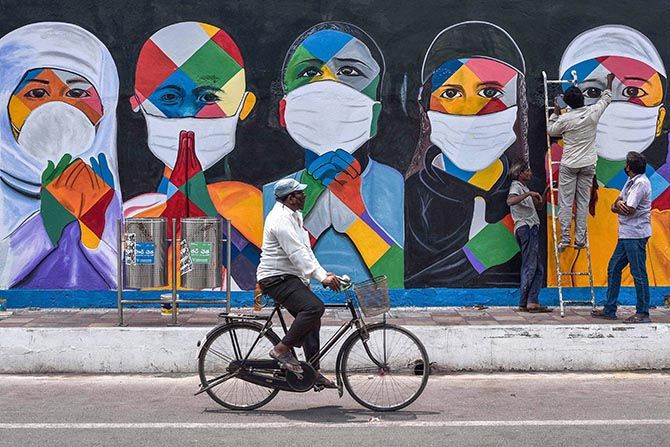'What accounts for the huge difference in death tolls between the most advanced countries and the relatively poorer countries?' mulls Virendra Kapoor..

Heat, humidity, genetic immunity, demographics, all in play.
Let us be clear.
The global battle against coronavirus pandemic has been far from perfect. Every country has muddled along, including China, failing to do something absolutely necessary -- and doing some other thing, which in hindsight, looks a sheer waste.
Absent a precedent or foreknowledge about the behavior of the newest virus, governments tweaked policy as they went along, unable to anticipate how the virus would behave.
Here in India, critics have panned the government for the terrible plight of the workers.
But, put your hands on your hearts, and say truthfully if, on the evening of March 24th, could anyone have foreseen the hardships millions of workers living in big cities would face.
Because even the government did not believe that after three weeks it will not be back to normal.
Allowing workers to return to their villages was not sensible anyway, it carried the twin risk of disruption of the economy and the heightened risk of carrying the virus to the hinterland.
Suffice to say everyone in Europe, North America as in India is wiser after the event.
Such 20:20 vision is a gift of hindsight.
Who and how anyone else would have handled the fight against the pandemic is unclear, though quite a few foreign leaders had initially dismissed it as of no consequence.
The US, UK, Brazil are the biggest culprits in this regard.
Given that we are an open society, it is for the government to defend its alleged acts of omission and commission.
But what we are interested in highlighting is the sharp difference in the number of cases and fatalities in India as against those in Europe and America.
Aside from searching for a vaccine to tame the virus, scientists are also examining the unusual phenomenon of a far lower death toll in the subcontinent than in the more advanced Western countries with superior healthcare systems.

India has done well to stave off large number of fatalities.
It has fewer than one in a million.
China, where it all started, recorded only about 5,000 deaths.
Thailand, where the virus went next, again has fewer than one death in a million.
Remarkably, Vietnam, Cambodia and Mongolia have thus far recorded no deaths.
In sharp contrast, Britain, Italy and Spain have lost 500 per million, the US, 300 per million, while Germany, which managed the pandemic better, about 100 deaths per million.
Among other factors, researches are exploring a link between obesity and corona deaths.
Generally, people in Asia tend to be leaner while those in Western countries overweight and fat.
For instance, 36 percent of the Americans are obese as against four percent in India, two percent in Japan and Vietnam.
As per the medical standards, 28 percent Britons, 24 percent Spaniards, 22 percent Germans were obese. Obesity is measured as per the body mass index.
What accounts for the huge difference in death tolls between the most advanced countries and the relatively poorer countries?
Could it be demographics? The average age of a country's population could be a factor.
Or the secret could lie in the vastly different weather conditions.
Both factors seemed to be favourable to India.

India is a relatively young country, with only seven percent of its population above the age of 65.
Western societies, in sharp contrast, are old and aging.
However, Japan, which has a much larger percentage of old people, has only recorded seven corona deaths per million.
But this could be explained by the fact that Japanese society is well served by a first-rate healthcare system and the people are known to maintain very high standards of personal hygiene and social distancing.
The reason for poor countries in Africa recording a low fatality rate is ascribed to continent's relatively young population.
Also, genetic factors could be at play.
People in Asia are supposed to have better immune systems, having perhaps grown used to live with polluted water, air, food, etc.
Again, unlike the Western populations, the anti-tuberculosis BCG vaccination at birth is supposed to protect against the virus.
As for the heat and humidity as a shield against the coronavirus in tropical countries like India, scientists believe that there is a definite connection here.
They are encouraged by the research into the SARS-I and SARS-II epidemics which established the link between heat and humidity and the spread of the virus.

Admittedly, the coronavirus is a totally new strain which so far has defied cure.
But the scientific community is increasingly veering to the view that the reason for high number of deaths in the developed world as against those in the developing world could well lie in different weather conditions, age and health profile of populations and the degree of genetic immunity.
Production: Aslam Hunani/Rediff.com











